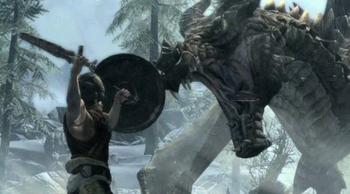Only one thing's for certain...death
A familiar blueprint
Bethesda lay down a great RPG foundation when it released Oblivion in 2006, so, unsurprisingly, Skyrim's blueprint isn't too dissimilar. Players choose a type of character and then aim to level up, increasing health, stamina and magicka. Carrying out objectives makes you stronger in a variety of areas, including pick-pocketing, archery and conjuration. Inevitably, time is spent travelling through towns trading and talking with non-playing characters (NPC) to pick up quests before embarking on dangerous missions, using a combination of magic and weapon skills, to fight against hordes of beastly creatures. Weapons can be crafted, food cooked, and spells mixed. Heck, money can be made in fist-fights or guild joined to become proficient at thieving or perhaps a master of the dark arts.
Indeed, Skyrim is overflowing with things to do. Buy a house, get married, spend hours trotting across the plains on horseback, or break into people's ramshackled huts to steal their precious belongings, players quickly realise their likes and dislikes and then spend time concentrating on whatever direction suits, mulling over which attribute-enhancing perks to boost, and joining guilds and factions to train in preferred skills. Spend hours with your head buried in the menu screens - agonising over what to sell and what to keep - moving between traders in one of the many towns, where training can be undertaken with NPCs, or gossip gleaned from townfolk chatting about Greybeards, dragons and precious treasures.
Once again Bethesda has done a great job at creating an incredible atmosphere and cast of interesting characters who dish out quests at an alarming rate and churn out conversations that build on the existing Elder Scrolls lore. Skyrim feels alive thanks to its many inhabitants, but it's the world around them that provides the game's well-metered heartbeat. Skyrim is a huge place with the landscape stretching as far as the eye can see, dotted with towns, ruined castles and dark dungeons. It's a place that demands to be explored, and, boy, explore it you can.

Bigger, better, harder
Skyrim is a bleaker place than Oblivion, with less flora and fauna and more wilderness to explore. The icy-cold mountainous regions also provide a sense of isolation which serves to keep senses on high alert. There's always something to see, including the return of many dungeons that are crammed full of loot. Whereas dungeon design is a bit repetitive in Oblivion, they're so much more fun to explore in Skyrim, with many of these dark, torch-lit areas having multiple levels that are full of traps and puzzles to solve. Like Oblivion, adventurers are well-rewarded with loot for delving deep, but now it's much harder to secure the treasure than ever before.
The enemies you encounter in Skyrim are extremely tough to beat, and the revamped combat system takes a little getting used to, especially for those partial to Oblivion's much more casual hack-and-slash approach to fighting. Combat in Skyrim is now far more challenging and even low-level enemies are able to take a decent chunk of health away in quick-fire attacks. Thankfully there's a stupendous array of weapons on offer, all of which can be improved, and a dazzling number of spells can be used to provide an edge. Nonetheless, many fights now require tactically thought, with the need to combine defensive blocks with attacks, thus ensuring spells are equipped against a certain type of enemy.
Death awaits
Death is a certainty in Skyrim, and the grim reaper appears numerous times, but this tougher challenge makes the game more cerebral. Nonetheless, this does mean combat is so much more satisfying and the battles white-hot intense. The addition of finishing animations helps add cinematic flair to some of the fights and ability to dual-wield - use different weapons in each hand - leads to countless possibilities in combat. But it feels quite strange that a two-handed weapon (or a weapon and shield) and spells cannot be cast together - there's a need to pause and switch - but once this system of fighting becomes ingrained, and it assuredly will, the changes make battles more intense, tactical and challenging - something that was totally missing in Oblivion.


